Table of Contents
Get started with MyPerfectResume today!
- Build a resume on any device
- Pick an ATS-friendly template
- Tailor with AI copy suggestions
Why this resume works
- Highlights industry-specific skills: The resume showcases CNA skills through various roles, proving the job seeker’s expertise in patient care and medical documentation.
- Quantifies accomplishments: Measurable accomplishments such as monitoring 25+ patients daily and reducing injuries by 15% illustrate the job seeker’s tangible impact in healthcare settings.
- Uses action-oriented language: Action verbs like “monitored,” “assisted,” and “conducted” effectively engage the reader, emphasizing proactive patient care responsibilities.
More Nursing Assistant Resume Examples
Review our nursing assistant resume examples to see how to showcase your patient care skills, clinical experience, and compassion. These samples provide a strong foundation for creating a nursing resume that highlights your qualifications in healthcare roles.
Entry-Level Nursing Assistant
Why this resume works
- Touches on awards and recognition: The resume emphasizes awards and recognition, such as Employee of the Month, validating the job seeker’s impressive performance in past roles.
- Features a strong education section: Relevant degrees are clearly presented in the education section, emphasizing a strong academic foundation critical for early career stages.
- Shows digital literacy: Digital literacy and computer skills are demonstrated through experience with electronic health records, indicating readiness for modern healthcare environments that rely on digital tools.
Mid-Level Nursing Assistant
Why this resume works
- Includes a mix of soft and hard skills: Showcases a balanced skill set through experiences in patient care, vital monitoring, and maintaining accurate records, highlighting both interpersonal skills and technical abilities.
- Demonstrates language abilities: Demonstrates language proficiency in English, Spanish, and Mandarin, indicating strong language skills and cross-cultural communication skills essential for effective patient interaction.
- Displays technical expertise: Highlights expertise with specialized tools like electronic health records (EHR) systems and certifications such as BLS and ACLS from the American Heart Association.
Experienced Nursing Assistant
Why this resume works
- Lists relevant certifications: Lists relevant certifications such as CNA, BLS, and ACLS, underscoring the job seeker’s commitment to maintaining professional standards and continuous learning in healthcare.
- Showcases impressive accomplishments: Highlights accomplishments, such as reducing patient falls by 15% and enhancing satisfaction scores by 20%, demonstrating significant impact and senior-level expertise in patient care.
- Sections are well-organized: Well-organized sections with clear headers and concise bullet points ensure easy scanning and make key responsibilities and achievements readily accessible throughout the resume.
Nursing Assistant Resume Template (Text Version)
Olivia Davis
Westbrook, ME 04098
(555)555-5555
Olivia.Davis@example.com
Professional Summary
Dedicated Nursing Assistant with 9 years of diverse healthcare experience. Proficient in patient care, with a strong focus on improving patient outcomes, enhancing team collaboration, and ensuring high-quality medical documentation. Fluent in English, Spanish, and basic French.
Work History
Nursing Assistant
Harmony Health Center – Westbrook, ME
January 2022 – March 2025
- Monitored 25+ patients’ vital signs daily.
- Assisted with mobility and transfers, reducing injuries by 15%.
- Conducted routine bed baths and grooming sessions.
Certified Nursing Aide
Riverside Medical Group – Westbrook, ME
January 2018 – December 2021
- Provided basic patient care for 30+ residents.
- Documented care activities, ensuring 98% accuracy rate.
- Supported nursing staff during procedures and exams.
Patient Care Technician
Greenfield Hospital – Westbrook, ME
January 2016 – December 2017
- Administered bedside care and assisted in patient hygiene.
- Recorded patient data, achieving 100% compliance.
- Prepared patient rooms, ensuring a 25% faster turnover.
Skills
- Patient Care
- Vital Signs Monitoring
- Mobility Assistance
- Patient Hygiene
- Medical Documentation
- Bedside Manner
- Collaboration
- Attention to Detail
Education
Bachelor of Science Nursing
University of Springfield Springfield, Illinois
May 2016
High School Diploma General Studies
Springfield High School Springfield, Illinois
June 2012
Certifications
- Certified Nursing Assistant (CNA) – Illinois Department of Public Health
- Basic Life Support (BLS) – American Heart Association
Languages
- English – Beginner (A1)
- Spanish – Beginner (A1)
- French – Beginner (A1)
Popular Skills for a Nursing Assistant Resume
A well-crafted resume skills section is essential for highlighting the technical and soft skills necessary to excel as a nursing assistant. Demonstrating abilities such as patient care techniques and effective communication can prove your readiness for this vital role.
Below are a few of the top soft skills frequently listed on nursing assistant resumes.
| Soft Skills | % of resumes with this skill |
|---|---|
| Patient care | 60.99% |
| Patient relationship building | 26.19% |
| Companionship and emotional support | 23.77% |
| Patient-focused care | 21.13% |
| Patient relations | 12.50% |
Here are a few examples of hard skills frequently included on nursing assistant resumes.
| Hard Skills | % of resumes with this skill |
|---|---|
| Direct patient care | 61.75% |
| Basic life support | 59.36% |
| Patient feeding | 51.61% |
| Recording vital signs | 30.96% |
| Electronic charting | 30.95% |
Related Resume Guides
- Geriatric Nurse Practitioner
- Hemodialysis Nurse
- Intensive Care Nurse
- Labor And Delivery Nurse
- Licensed Practical Nurse
- Neonatal Intensive Care Unit Nurse
- Neonatal Nurse
- Nurse Aide
- Nurse Care Coordinator
- Nurse Practitioner
- Obgyn Nurse
- Oncology Nurse
- Operating Room Nurse
- Pediatric Nurse
- Perioperative Nurse
- Pre Post Op Nurse
- Private Duty Nurse
- Registered Nurse
- School Nurse
- Trauma Nurse
Advice for Writing Your Nursing Assistant Resume
Explore tailored tips on how to write a resume for this profession, and discover how to highlight your skills, experience, and dedication to patient care effectively.
Write a strong professional summary
A professional summary is a brief introduction at the top of your resume that showcases your key skills, experiences, and achievements as a nursing assistant. It creates a strong first impression by quickly demonstrating why you are an excellent candidate for the job. This type of summary works best for experienced individuals as it highlights past work and accomplishments.
For those with limited experience, like recent graduates or career changers, a resume objective is more suitable because it outlines your career goals and how your skills align with the position.
When crafting your summary, use action-oriented language to highlight your impact. For instance, mention specific tasks you’ve excelled at or any recognition you’ve received in previous roles.
Emphasizing skills such as patient care, teamwork, and communication will demonstrate to employers that you can meet the demands of being a nursing assistant. Organize this section clearly to make it easy for readers to quickly grasp your strengths.
Nursing assistant resume summary examples
Entry-level
Compassionate and dedicated nursing assistant with a recent completion of a state-approved CNA training program. Certified Nursing Assistant (CNA) with hands-on experience from clinical practicums in long-term care facilities. Proficient in basic patient care, including vital signs monitoring, personal hygiene assistance, and mobility support. Committed to providing high-quality care and enhancing the well-being of patients.
Mid-career
Experienced nursing assistant with over 5 years of exceptional patient care in hospital and nursing home settings. Adept at performing routine tasks such as assisting with daily living activities, administering medications under supervision, and maintaining accurate patient records. Recognized for strong interpersonal skills, ability to work collaboratively within healthcare teams, and dedication to improving patient outcomes.
Experienced
Highly skilled nursing assistant with 10+ years of experience specializing in geriatric and palliative care. Proven track record in leading teams of junior CNAs, developing individualized patient care plans, and implementing advanced patient safety protocols. Certified in Advanced Cardiovascular Life Support (ACLS) and Dementia Care. Known for exceptional leadership qualities, advanced clinical competencies, and a commitment to delivering compassionate and efficient patient care.
Nursing assistant resume objective examples
Recent graduate
Recent graduate with a Certified Nursing Assistant (CNA) certification, eager to begin a career in healthcare. Passionate about providing high-quality patient care and support in a compassionate and efficient manner. Looking forward to contributing to a dynamic medical team while expanding my skills and knowledge in patient care.
Career changer
Dedicated professional transitioning into the nursing field as a Certified Nursing Assistant (CNA), bringing strong interpersonal skills and experience in customer service. Committed to delivering exceptional patient care and support, with an eagerness to contribute positively to patient well-being and healthcare team success.
Specialized training
Certified Nursing Assistant (CNA) with specialized training in geriatric care seeking an opportunity to contribute to a long-term care facility. Passionate about using my skills in elderly patient support, medication assistance, and daily living activities to improve resident quality of life.
Use our AI Resume Builder to quickly create a standout resume with professional templates and professionally written content suggestions.
Include relevant certifications and training
Listing your certifications, licenses, and specialized training is very important for a nursing assistant. These credentials show you have the necessary skills and knowledge to perform your job well.
Including a dedicated certifications section helps employers quickly see what qualifications you bring to the table. This can be especially important in technical fields like healthcare, where specific certifications are often required.
To create this section, list each certification clearly and include details like the issuing organization and the date received. For example, you might list Certified Nursing Assistant (CNA), Basic Life Support (BLS) Certification, or CPR Certification.
Place this section near your education information for easy access. Highlighting these achievements shows your commitment to keeping your skills up-to-date and meeting industry standards. This can improve your chances of getting hired or advancing in your career as a nursing assistant.
Example of a certifications section
Certified Nursing Assistant (CNA)
Issued by: National Council of State Boards of Nursing (NCSBN)
Expires 2025
Basic Life Support (BLS)
Issued by: American Heart Association
Expires 2024
Advanced Cardiovascular Life Support (ACLS)
Issued by: American Heart Association
Expires 2026
First Aid Certification
Issued by: Red Cross
Expires 2023
Patient Care Technician Certification (CPCT/A)
Issued by: National Healthcareer Association (NHA)
Issued 2021
You can use one of our professional resume templates to easily create a well-crafted resume that highlights your skills and qualifications.
Showcase your work experience
Emphasizing relevant work experience is essential for a nursing assistant resume. It showcases your skills, qualifications, and the value you can bring to a potential employer.
Arrange your work history in reverse chronological order to display your most recent roles first. This will allow employers to see your latest achievements and responsibilities quickly.
Begin with each job title, followed by the employer’s name, location, and employment dates. Use clear, action-oriented bullet points to describe your duties and accomplishments. For example:
- Assisted with daily living activities such as bathing, grooming, and feeding patients.
- Monitored vital signs and reported changes to registered nurses.
- Ensured patient rooms were clean and organized.
- Provided compassionate care and support to patients and their families.
Incorporate measurable results whenever possible to show your impact. For instance:
- Reduced patient falls by 15% through diligent monitoring and prompt assistance.
- Improved patient satisfaction scores by 10% through excellent bedside manner.
Focus on core responsibilities specific to nursing assistants, such as patient care, hygiene assistance, mobility support, vital sign monitoring, record keeping, communication with healthcare teams, and infection control.
5 nursing assistant work history bullet points
- Provided compassionate care to over 50 patients daily, ensuring their comfort and addressing their needs promptly.
- Assisted in medical procedures and patient examinations, improving workflow efficiency by 15%.
- Monitored vital signs and reported any significant changes to the nursing staff, contributing to a 20% decrease in emergency incidents.
- Maintained accurate and detailed patient records, enhancing communication between healthcare providers and improving overall patient care.
- Trained and mentored 10 new nursing assistants on best practices, resulting in a smoother onboarding process and improved team performance.
Using the right keywords from the job listing can help your resume get through applicant tracking systems (ATS) and catch the eye of recruiters.
Match your resume with the job description
Tailoring your resume to match job descriptions is essential, especially for a nursing assistant role. It highlights that you possess the specific skills and experience the employer seeks.
Employers often use applicant tracking systems (ATS) to filter resumes. Without the right keywords, your resume might not reach the hiring manager.
Start writing your ATS-friendly resume by carefully reading the job posting and noting important terms like “patient care,” “vital signs,” or “medical documentation.” Incorporate these keywords into your resume naturally.
For instance, if the job posting mentions “assisting with daily living activities,” you can include this in a bullet point: “Assisted patients with daily living activities such as bathing, dressing, and feeding.”
To create a targeted resume, clearly list your skills in a separate section and emphasize any achievements with numbers or specific examples when possible. This will help employers quickly recognize that you are an ideal candidate for their nursing assistant position.
Use our ATS Resume Checker to quickly find and fix problems in your resume. Get tips on how to make it better so you can stand out to employers.
Salary Insights for Assistants
Top 10 highest-paying states for assistants (new data)
Assistants earn varying salaries across the United States, with a national average of $54,283. The table below highlights the states where assistants command the highest compensation.
Our salary information comes from the U.S. Bureau of Labor Statistics’ Occupational Employment and Wage Statistics survey. This official government data provides the most comprehensive and reliable salary information for writers across all 50 states and the District of Columbia. The figures presented here reflect the May 2025 dataset, which is the most recent available as of this publication.
| State | Average Salary |
|---|---|
| Iowa | $78,540 |
| California | $75,430 |
| New Jersey | $72,050 |
| Massachusetts | $67,100 |
| New York | $66,530 |
| Ohio | $61,120 |
| Illinois | $59,640 |
| Missouri | $59,000 |
| Texas | $59,800 |
| Maryland | $58,530 |
FAQ
Do I need to include a cover letter with my nursing assistant resume?
Adding a cover letter to your nursing assistant resume can be very beneficial, even if it’s not mandatory. It allows you to share your story in a more personal manner and demonstrate why patient care is important to you.
You can use your cover letter to explain your interest in the specific facility or role, and highlight experiences that make you an ideal candidate. For instance, if you’ve cared for elderly patients and the job involves geriatric care, mentioning this experience shows you’re well-suited for the position.
A cover letter also allows you to touch on soft skills like empathy, communication, and teamwork — qualities essential for a nursing assistant but not always apparent on a resume. Explore cover letter examples for inspiration and guidance.
We recommend using our Cover Letter Generator to easily create a cover letter based on your resume or write a new one with customized content suggestions.
How long should a nursing assistant’s resume be?
A nursing assistant’s resume should ideally be one page long. This resume length ensures your document is concise and easy for hiring managers to review quickly.
Highlight your most recent and relevant experiences, such as patient care skills, CPR certifications, and any specific training related to the role.
Include achievements that demonstrate your ability to handle the responsibilities of a nursing assistant effectively.
Keeping your resume focused ensures that your key qualifications stand out; if necessary, consider a two-page resume for more extensive experience.
How do you write a nursing assistant resume with no experience?
Creating a resume with no experience as a nursing assistant means emphasizing your relevant skills, education, and practical training. Here are a few tips:
- Begin with a compelling objective statement that shows your passion for patient care and desire to join a healthcare team.
- Detail your education, such as your CNA certification or related healthcare coursework, including the institution name, completion date, and any honors.
- Highlight any clinical training or internships, even if unpaid. Describe tasks like assisting with daily activities, taking vital signs, or providing basic patient care.
- Make sure to showcase transferable skills like communication, empathy, teamwork, and time management.
- Include volunteer work in healthcare settings or roles involving customer service or caregiving (such as babysitting).
This approach will show you’re prepared for the nursing assistant role.
Rate this article
Nursing Assistant
Share this page
Additional Resources
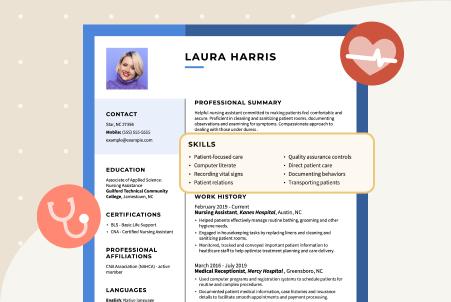
Nursing Skills: Examples & Tips for Your Resume
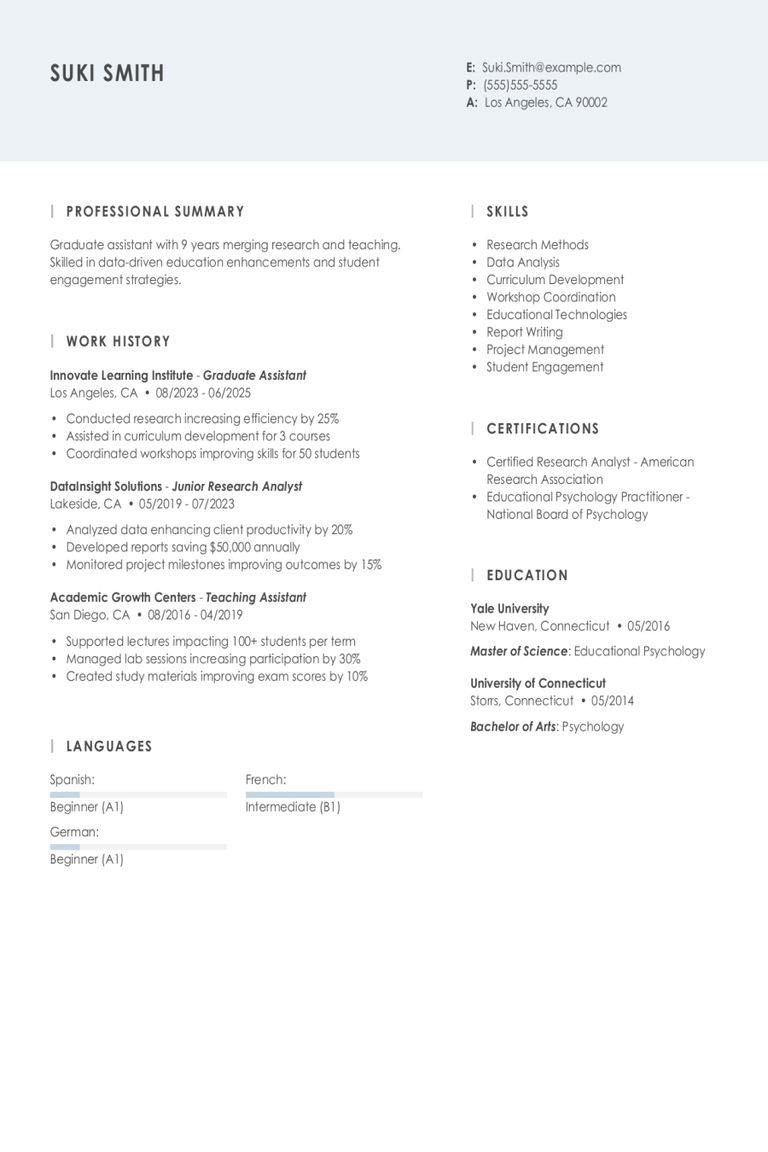
Graduate Assistant Resume Examples & Templates
Discover how graduate assistants can effectively showcase their teaching and research skills with our resume examples. Learn how to highlight your academic experience and multitasking abilities to stand out in
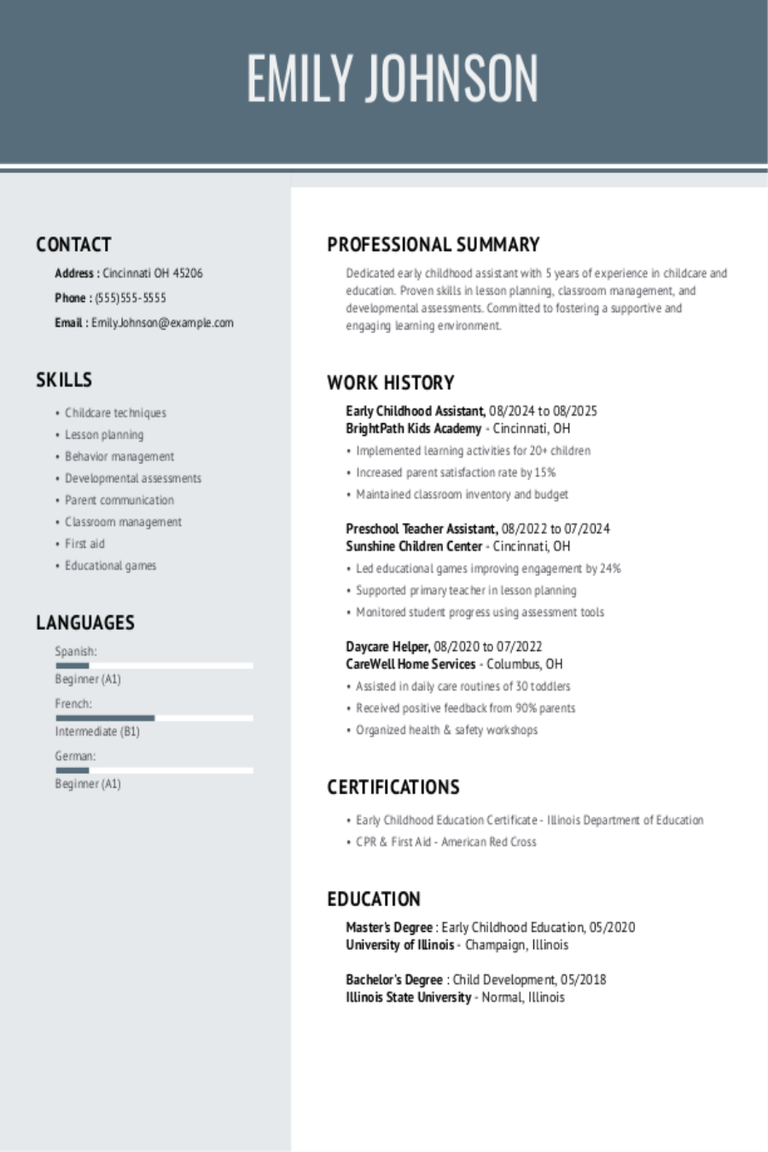
Early Childhood Assistant Resume Examples & Templates
Browse early childhood assistant resume examples to see how to highlight your experience nurturing young minds, creating a safe environment, and supporting teachers. Discover how to highlight your ability to
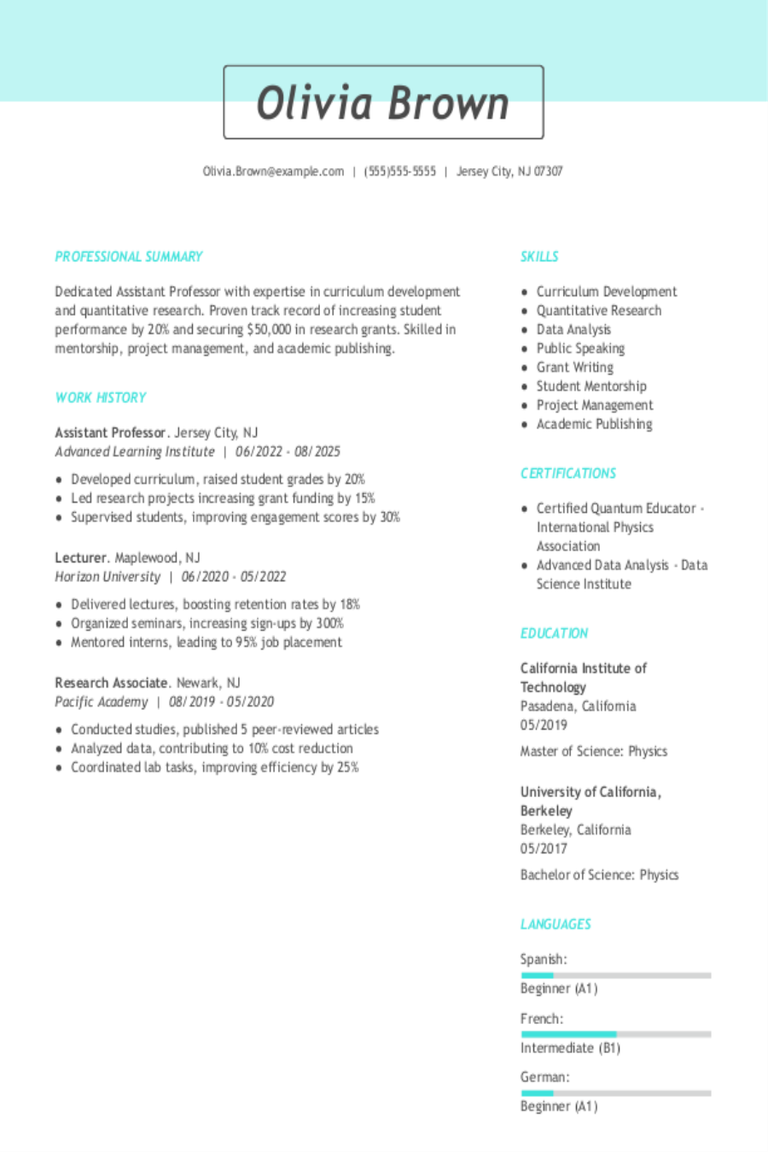
Assistant Professor Resume Examples & Templates
Explore assistant professor resume examples that highlight research expertise, teaching experience, and academic accomplishments. Learn effective ways to demonstrate your knowledge, organization, and ability to inspire students in the classroom.Build
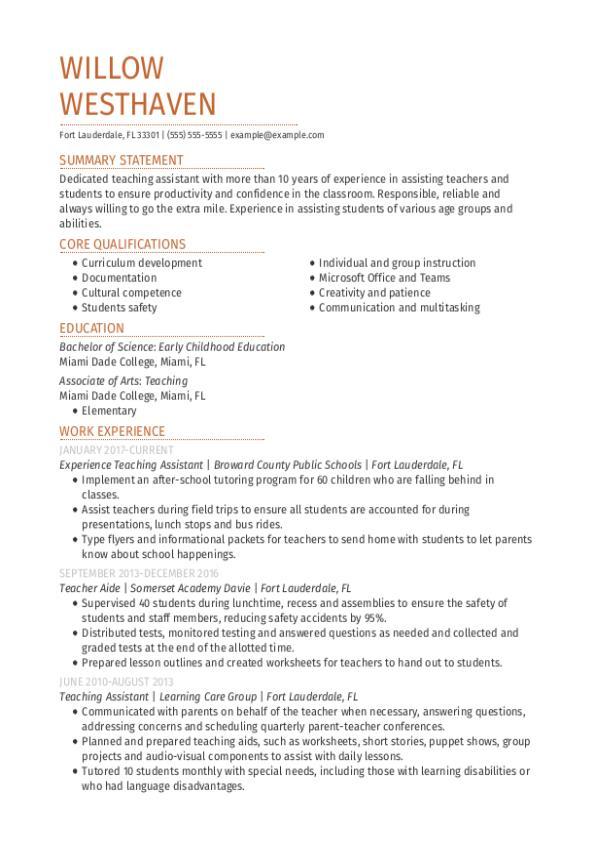
Teaching Assistant Resume Examples & Templates
Browse teaching assistant resume examples to see how to highlight your experience supporting classroom instruction, assisting teachers, and engaging with students. Use these samples and tips to showcase your experience,
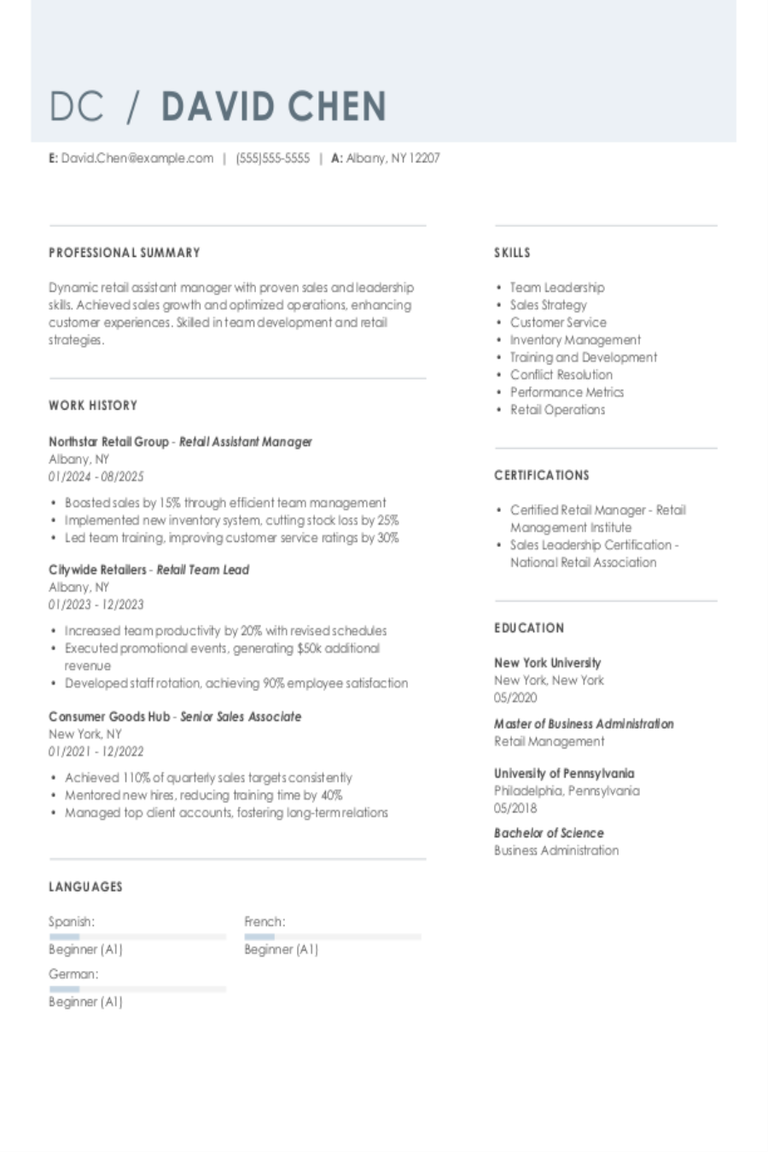
Retail Assistant Manager Resume Examples & Templates
Explore retail assistant manager resume examples to see how to highlight your experience handling customer service, managing inventory, and leading a team. Use these samples and tips to showcase your
